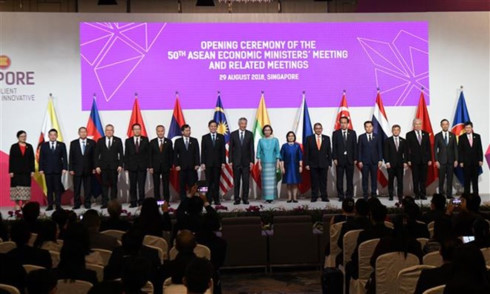50th ASEAN Economic Ministers Meeting opens in Singapore
Thứ Tư, 29/08/2018, 23:40
The 50th ASEAN Economic Ministers (AEM 50) Meeting and Related Meetings kicked off in Singapore on August 29 with the participation of economic leaders from 10 ASEAN member states and partner countries.
 |
The Vietnamese delegation, led by Deputy Minister of Industry and Trade Tran Quoc Khanh, participated in the meetings.
In his speech at the opening ceremony, Singaporean Prime Minister Lee Hsien Loong highlighted the establishment and development of the Association of Southeast Asian Nations (ASEAN).He said the bloc has tremendous economic potential with a strong market of over 630 million people.
The grouping’s GDP growth has averaged 5.4 percent in recent years, well above the global average, and is projected to expand around this rate over the next five years, he noted.
ASEAN is forecast to become the fourth-largest economy in the world by 2030, just behind the US, China and the European Union (EU), he said.
Lee added that strengthening regional economic cooperation and integration is the key for ASEAN to fully tap its potential, including pressing on with the implementation of the ASEAN Economic Community (AEC) Blueprint 2025, as well as supporting an open and inclusive multilateral system amid growing trade tensions.
Escalating trade tensions between the US and its key trading partners have put pressure on the rules-based multilateral trading system, which has underpinned ASEAN’s growth and prosperity, he said, adding that each ASEAN member state is also subject to different pulls and pressure from bigger powers.
In these circumstances, all the bloc’s members must stay united and strive to maintain cohesion and exert significant efforts to reach the signing of the Regional Comprehensive Economic Partnership (RCEP) at the end of this year to strengthen economic linkages and enhance trade and investment flows, Lee stressed.
Singaporean Minister for Trade and Industry Chan Chun Sing, who is the AEM chairperson, said ASEAN leaders are pushing ahead with some initiatives to further enhance regional cooperation, specifically in the fields of digital connectivity, customs clearance and tourism.
He added that the establishment of the AEC in 2015 brought benefits to businesses and customers in the region. Most of non-tariff barriers have been diminished with less stringent and more transparent service regulations. The implementation of business investment rules has helped promote intra-bloc trade.
AEM 50 will run until September 1 with a series of related meetings such as the 32nd ASEAN Free Trade Area (AFTA) Council Meeting and the 21st ASEAN Investment Area (AIA) Council Meeting.
ASEAN economic ministers are due to meet with their counterparts from dialogue partner countries namely Australia, Canada, China, India, Japan, the Republic of Korea, New Zealand, Russia and the US.
The sixth Regional Comprehensive Economic Partnership (RCEP) Ministerial Meeting, the 11th Mekong-Japan Ministerial Meeting, and the 10th Cambodia, Laos, Myanmar and Vietnam (CLMV) Economic Ministers’ Meeting will be held as part of AEM 50.
Founded in 1967, the ASEAN now groups Brunei, Cambodia, Indonesia, Laos, Malaysia, Myanmar, the Philippines, Singapore, Thailand and Vietnam.
VNA

